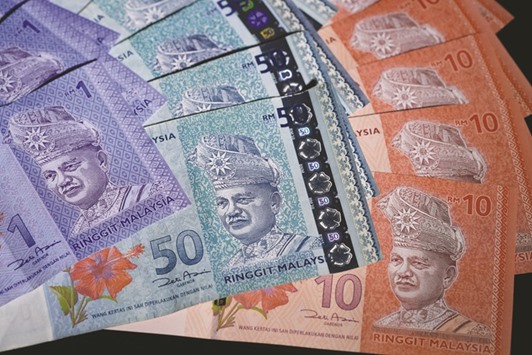A tumultuous year for the Malaysian ringgit shows the volatility that can occur when domestic upheaval collides with shifts in global markets.
The best-performing emerging-Asia currency in the first three months of 2016 has become the worst this quarter after the state-run 1Malaysia Development Bhd fund defaulted on a bond.
International forces may yet win out: with political risks in Malaysia subsiding, the door is opening for the ringgit to rejoin a global rally in currencies of oil-producing nations.
The ringgit’s top forecaster, ING Groep, sees a 10% jump by September 30 based on closing prices yesterday, after the election victory of Prime Minister Najib Razak’s party in the key state of Sarawak suggested the 1MDB controversy hadn’t shaken his hold on power.
“The currency is very undervalued and still has room to appreciate,” said Tim Condon, head of Asia research in Singapore at ING, which led Bloomberg’s most recent rankings for ringgit forecasts. “The premier won big in Sarawak, and if he wins big in the by-elections, he could rightfully claim that he’s got the support of the people. That would put a cap on further depreciation pressure.”
Condon predicts the ringgit will strengthen to 3.72 per dollar by the end of September and 3.66 by year-end.
The consensus among strategists surveyed by Bloomberg is for the exchange rate to end 2016 at 4.08. Its 5.4% drop this quarter was spurred by the 1MDB crisis and signs the US is moving closer to raising interest rates.
The currency fell as much as 1.1% yesterday to a 10-week low of 4.1298 per dollar and closed 1% lower at 4.1235 in Kuala Lumpur.
1MDB, which is at the centre of international probes over money laundering and embezzlement, reiterated to bondholders on Monday that its commitment to resolve a dispute with Abu Dhabi’s sovereign-wealth fund that led to the debt default last month. Singapore’s central bank ordered BSI SA’s unit to shut down yesterday amid one of the investigations into 1MDB.
The Monetary Authority of Singapore served BSI Bank a notice of intention to withdraw its status as a merchant bank for breaches of money laundering rules, it said in a statement.
The Swiss Attorney General said it also began criminal proceedings against the financial institution based on information from a probe into 1MDB. The MAS referred six senior BSI executives to the public prosecutor.
Standard Chartered says the trajectory of US borrowing costs will be key to determining the Malaysian currency’s performance. Analysts at the bank, which gets more than half its revenue from emerging markets, don’t expect the Federal Reserve to raise rates this year, unless the US data improve enough over the next few months to warrant one increase. As a result, it sees the ringgit appreciating to 3.95 per dollar by the end of the third quarter.
“The Malaysian ringgit will be an outperformer in the region over the medium term,” said Divya Devesh, the bank’s Singapore-based foreign-exchange strategist for Asia. “The primary drivers are going to be what happens to oil prices and what happens with the Fed and the dollar. Anything else is really secondary.”
Even with its loss since the end of March, the ringgit is still the biggest gainer among regional peers in 2016 after the yen, following a 10% advance in the first quarter. And the currency is the most correlated with oil prices since 2012, suggesting it has every reason to reprise the appreciation.
Forwards on the ringgit are tracking Brent crude more closely than at any time since 2012. One-month non-deliverable contracts moved in line with oil about 56% of the time over the past 120 days, based on a correlation study. The securities’ synchronisation peaked at 69% in 2012 and was as weak as zero near the end of 2013.
The third-best ringgit forecaster, BNP Paribas, sees limited gains for the currency because risks to the global economy undermine the prospects for oil to keep climbing from its 12-year low in January. The currency tumbled 19% last year as Brent slid 35%.
Prime Minister Najib has come under fire for a political donation he received from Saudi Arabia and the levels of 1MDB’s debt, leading to calls for his resignation.
Najib has denied any wrongdoing over the $681mn that appeared in his personal accounts before the 2013 elections. His support base will be tested further in by-elections in the northern state of Perak and the central state of Selangor on June 18.
And while speculation is building that the Fed is getting ready to raise rates, the ringgit isn’t any more exposed to higher US borrowing costs than its counterparts elsewhere in the developing world, according to ING’s Condon.
“It could be a big factor for all emerging-market currencies but I don’t think the ringgit stands out as especially vulnerable,” he said. “The noise around 1MDB will dissipate and the weakness that we’ve seen in May will reverse.”

Malaysian ringgit banknotes of various denominations are arranged for a photograph in Tokyo. Ringgit’s top forecaster ING sees a 10% jump by September 30 based on closing prices yesterday.
